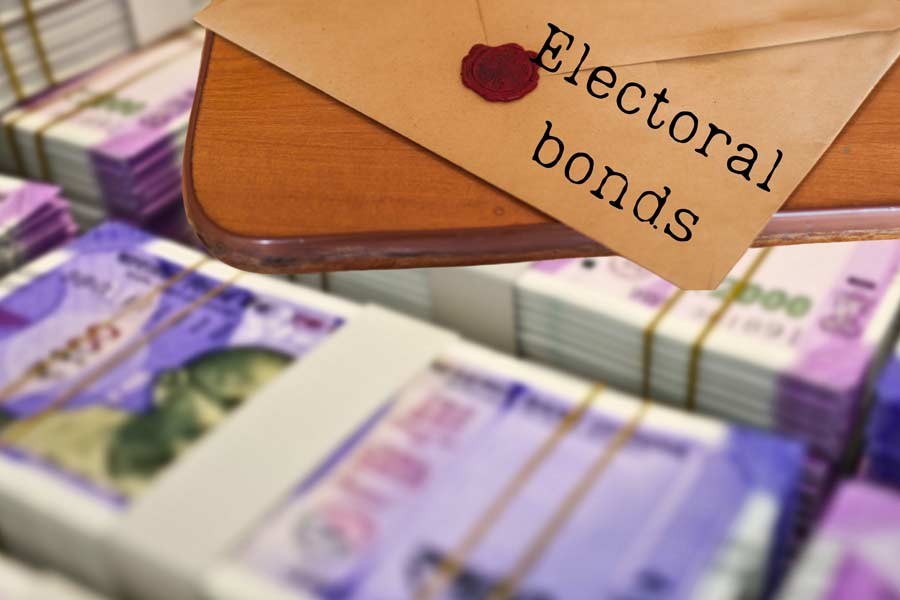Small and obscure firms elbowed out the Big Boys of Business as they mounted a frenzied purchase of electoral bonds from the State Bank of India over a period of almost five years, which they then funnelled to political parties in the country.
On Thursday, the veil of anonymity was finally ripped from large corporate entities and fat cats of the country as the Election Commission of India put out a trove of information on the controversial electoral bonds, complying with the directive of the Supreme Court that determined the scheme was “unconstitutional” and “arbitrary”.
While the BJP received the lion’s share of the bonds, the Trinamul Congress
was second.
The startling fact was that the biggest purchaser of the electoral bonds turned out to be an unknown Coimbatore-based lottery firm that had splashed out Rs 1,368 crore in 21 separate bouts of purchases between October 21, 2020, and January 9, 2024.
Future Gaming is led by “lottery king” Santiago Martin. In October last year, the Enforcement Directorate reportedly raided four premises linked to Martin in Tamil Nadu.
The second biggest buyer was the Hyderabad-based Megha Engineering and
Infrastructures Ltd (MEIL) which bought bonds worth Rs 967 crore.
MEIL is present in verticals like hydrocarbons, transportation, power, irrigation, drinking water and manufacturing. The websites of both these groups witnessed heavy traffic after the electoral data was announced and more granular details about their businesses could not be ascertained.
The pecking order was rounded off by Navi Mumbai-based Qwik Supply Chain Pvt Ltd (Rs 410 crore), Haldia Energy (Rs 377 crore) and Anil Agarwal’s mining and metals giant Vedanta (Rs 376 crore).
The Ambanis, the Tatas and the Adani group did not figure in the list.
But there was a fair spattering of tycoons and large corporate groups including London-based billionaire Lakshmi Niwas Mittal, Bharti Airtel, Bajaj Auto and Bajaj Finance, DLF group, Dilip Shanghvi’s Sun Pharmaceuticals, Cipla, Kumar Mangalam Birla’s Grasim Industries and Century Textiles, Dr Reddy’s Laboratories, Piramal Enterprises, Apollo Tyres, and Goa-based Dempo Industries.
Aditya Birla firm Essel Mining too figured, with its cumulative contribution amounting to Rs 220 crore. Group firm UltraTech Cement bought a modest Rs 35 crore worth of bonds. Utkal Alumina, another Birla group company, purchased bonds worth nearly Rs 147 crore.
Financial services giants like Muthoot Finance and Edelweiss, Gujarat-based Torrent Pharmaceuticals and Torrent Power, film exhibitor PVR, and TVS Motors also figured on the list.
The SBI data released by the Election Commission showed that the parties that redeemed electoral bonds included the BJP, Trinamul Congress, Congress, AIADMK, BRS, Shiv Sena, TDP, YSR Congress, DMK, JDS, NCP, JDU, RJD, AAP and the Samajwadi Party.
Industry sore
A section of industry was livid over the disclosures. They were upset that the government’s guarantee of anonymity had counted for nothing after the verdict. “The less said the better,” said an insider.
Some wondered how some obscure companies had rustled up so much money to buy the bonds amid dark suggestions that they may have been fronting for other – much bigger – companies.
Some remarked that this ruse may have been used to shovel money to the political parties in the Opposition, fearing a backlash if their names were revealed.
Others felt that some donors may have deliberately chosen to create a smokescreen around the entire operation just in case the details spilled out into the public domain – as it has now.
Corporate insiders say that several small firms willingly act as a pass-through for funds between a corporate giant and a political party.
They take cash from a political party and give it to a large corporate entity that buys the bonds which, in turn, are routed back to the political party.
“Some corporates take the help of brokers to funnel cash. The broker keeps a cut, the companies get the cash, and the political parties can clean up their books,” a corporate lawyer said.
At least two companies from Bengal are among the larger donors. They include Haldia Energy Ltd, a wholly owned subsidiary of CESC Ltd, the flagship of the RP-SG group.
Other RP-SG group entities that prominently feature on the list are Dhariwal Infrastructure, Philips Carbon Black Ltd (PCBL) and Crescent Power Ltd.
Other prominent donors from Bengal include Keventer Foodpark and MKJ Enterprises Ltd, ITC Ltd, Ambuja Housing & Urban Infrastructure Ltd, IFB Agro Industries Ltd, Merlin Recreation Pvt Ltd, UM Cables Ltd, Star Cement Meghalaya Ltd, among others.
Rs 1cr bonds
An overall 22, 217 electoral bonds were purchased between April 2019 and February 2024 and 22,030 bonds were redeemed by political parties.
According to the SBI’s compliance affidavit, a total of 3,346 bonds were purchased between April 1, 2019, and April 11, 2019. Between April 12, 2019, and February 15, 2024, a total of 18,871 bonds were purchased while 20,421 bonds were redeemed.
The electoral bonds were available in denominations from Rs 1,000 all the way up to Rs 1 crore. The data reveal that the Rs 1 crore bond was the most sought after. There were 11,671 entries showing purchases of bonds worth Rs 1 crore.
The details reveal that there were over 4,620 transactions involving the Rs 10 lakh bond while purchasers bought 2,228 bonds worth Rs 1 lakh.
The data provide information on donors who bought bonds of three denominations — Rs 1 lakh, Rs 10 lakh and Rs 1 crore — dating back to April 12, 2019. The data have been put in the public domain, following the Supreme Court directive, in two parts.
The first file, titled Part I, contains the names of “purchasers” — companies that bought electoral bonds — with the date of purchase and denomination. This document runs into 337 pages.
Part II, which has 426 pages, contains the names of the political parties that cashed the bonds, with denominations and dates.











